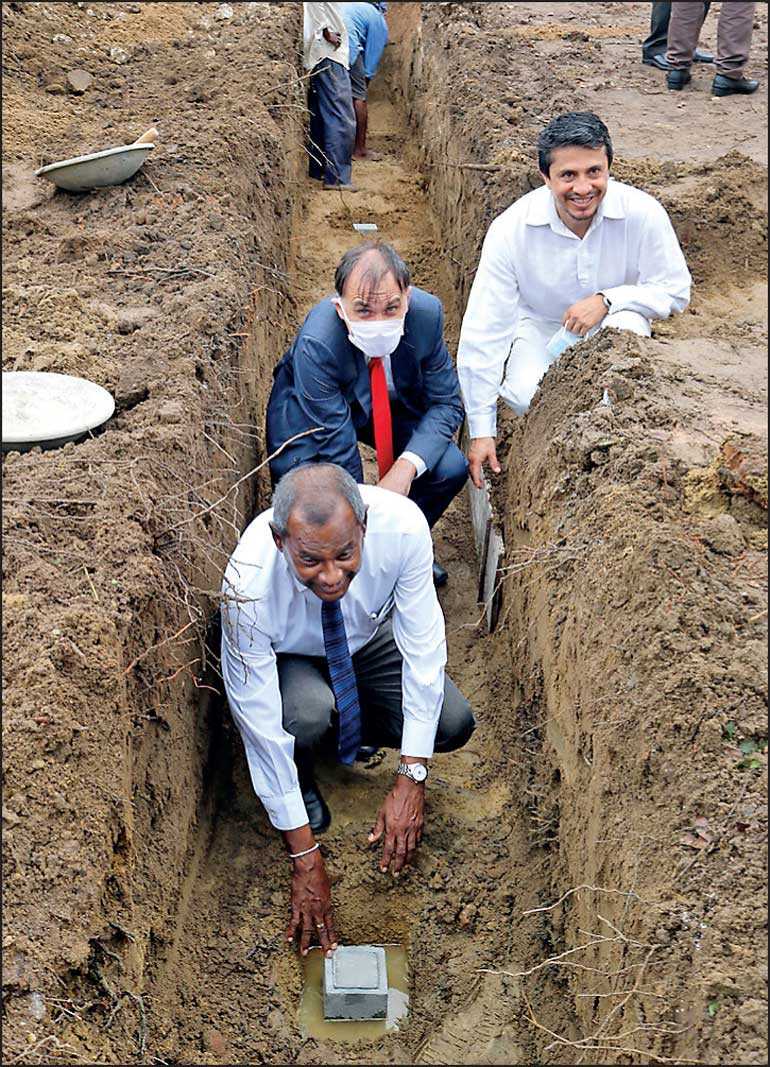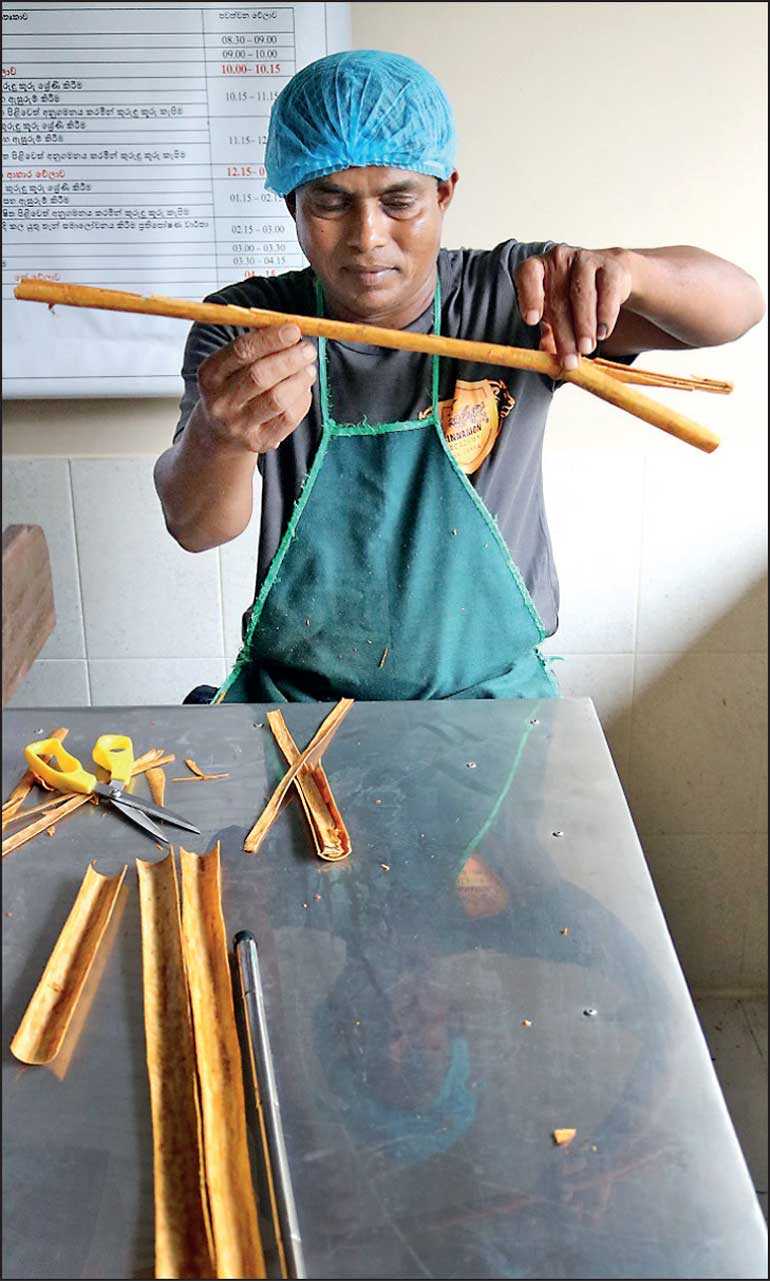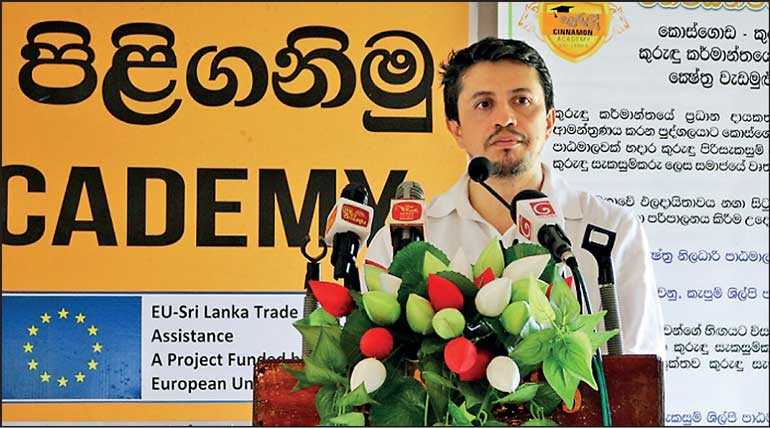Monday Feb 16, 2026
Monday Feb 16, 2026
Wednesday, 19 August 2020 00:00 - - {{hitsCtrl.values.hits}}

CTA Chairman Sarada De Silva, EU Delegation to Sri Lanka and the Maldives Head of Cooperation Frank Hess and UNIDO Dr. Jairo Andres Villamil-Diaz laying the foundation stone


UNIDO Dr. Jairo Andres Villamil-Diaz speaking at the event
The Cinnamon Training Academy (CTA) kicked off construction of a cinnamon processing centre called Bought Tree Factory (BTF) at Kosgoda, recently.
The setting of the foundation stone ceremonially took place at the CTA with the participation of EU Delegation to Sri Lanka and the Maldives Head of Cooperation Frank Hess, United Nations Industrial Development Organization (UNIDO) Dr. Jairo Andres Villamil-Diaz, Southern Provincial Council in the Galle district Balapitiya Pradeseeya Sabha Chairman Saman De Silva, Ministry of Home Affairs Divisional Secretary Balapitiya B. P. S. Anuradhi, Department of Export Agriculture and Board of Directors of the CTA member Director Dr. G Jayasinghe, including Chairman Sarada De Silva.
The CTA is expanding its existing training premises by adding a cinnamon processing centre with the objective of optimising their performance and financial sustainability. The new addition will generate year-round income, particularly during the harvest season when the demand for training is lower and the demand for processing is higher.
The processing centre would purchase cinnamon trees at farm gate, removing the need for a middleman, enabling upstream value chain actors, particularly smallholders in Balapitiya, Karandeniya and Ambalangoda to achieve a higher margin on their products.
Foreseen to be fully operational by the year’s end, the cinnamon processing centre will generate 20 new jobs and more than 100 indirect job opportunities. The cinnamon processing centre will have a processing capacity of 24,000 cinnamon trees with an output of 1,350 kilos of processed cinnamon per month in two harvesting seasons.
At its full capacity, the cinnamon processing centre could generate an additional sales revenue of Rs. 2.7 m per month for the CTA.
In his welcome speech, Sarada de Silva congratulated the Chief Guest, former Minister of Plantation Industries and Export Agriculture Dr. Ramesh Pathirana for his recent reappointment to the Parliament, and honoured him for his service and contribution to strengthening Sri Lanka’s agricultural exports, particularly for the cinnamon industry.
Then de Silva also recognised the financial support of the EU and the technical support of UNIDO towards the construction of the cinnamon processing centre, which takes place within the framework of the EU-Sri Lanka Trade-Related Assistance project co-implemented by UNIDO and the International Trade Centre.
As the Guest of Honour, Frank Hess underscored other milestones for the CTA supported by the project, such as the achievement of the accreditation of National Vocational Qualification (NVQ) by the Tertiary and Vocational Education Commission (TVEC) for offering NVQ Level 3 and Level 4 trainings serving the cinnamon industry, as well as the approval by TVEC on national competency standards (NCS) and NCS-based curricula on cinnamon field and factory operations.
NVQ-certified trainees typically see a 20-30% increase in productivity, which ultimately lowers production costs and as a nationally recognised system for granting of tertiary education, facilitates achievement of higher education.
Beyond the CTA, the project also supported value chain development for the spice sector, writ large, including on pursuing Sri Lanka’s anticipated first-ever geographical indication (GI) product, Ceylon Cinnamon. Under the technical guidance of UNIDO and partnership of the Sri Lanka Export Development Board, a GI application has been lodged with the EU.
Based in Kosgoda, the CTA was established in 2013 to meet the cinnamon industry’s need for technically competent cinnamon processors. The CTA was a result of a public-private partnership between UNIDO, the World Trade Organization’s (WTO) Standards and Trade Development Facility (STDF), the Spice Council (TSC) of Sri Lanka and by the Government of Sri Lanka though the EDB.
The CTA develops vocational skills and competencies for the cinnamon production and manufacturing industry. It trains actors along the cinnamon value chain to increase production capacity, to facilitate compliance with international food safety standards, and to stimulate employment in the cinnamon industry.